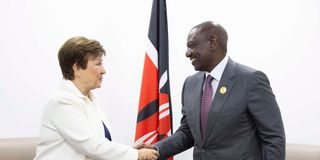House budget team warns Ruto IMF reforms will hurt economy

President William Ruto during a meeting with IMF Managing Director Kristalina Georgieva in Sharma El-Sheikh, Egypt.
The Parliamentary Budget Office (PBO) has warned that President William Ruto’s fiscal consolidation plans, which are being pushed by the International Monetary Fund (IMF) as part of its loan deal with Kenya, could derail the growth of the economy.
Some of the fiscal consolidation measures planned by President Ruto are reducing government non-priority spending, cutting subsidies on fuel, food and electricity, reducing tax incentives and raising tax collection, privatising select state-owned enterprises (SOEs) and cutting bailouts to Kenya Airways).
These and other reforms are being pushed by the IMF as part of its $2.34 billion (Sh292 billion) 38-month Extended Credit Facility and Extended Fund Facility loan arrangements with Kenya aimed at cutting the fiscal deficit.
The Kenya Kwanza government wants to undertake fiscal consolidation that will enable it to achieve a deficit financing target of 5.8 per cent of GDP in the 2022/2023 financial year and 3 per cent by 2026/2027.
The PBO, a key office that advises lawmakers on fiscal issues, says President Ruto’s fiscal consolidation will reduce economic output, which will hurt the economy more than it will help it.
The office said that reducing government expenditure will invariably lead to lower output and has implored the President to strike the right balance to undertake fiscal consolidation without harming economic growth.
“Despite the perceived gains of fiscal consolidation on debt accumulation, conventional wisdom indicates that this is likely to have a contractionary effect on economic activity, at least in the short run,” said PBO acting Director Martin Masinde.
“Economic theory heralds that in order to spur economic production in times such as what Kenya is currently facing, the economy requires injections into the financial system. The strategy adopted by the new administration of fiscal consolidation is in contrast,” he added.
President Ruto’s fiscal consolidation plans have not kicked off as smoothly as he would perhaps have been hoping due to a sharp rise in recurrent spending needs.
The Head of State in his inaugural speech to a joint sitting of Parliament in September last year had promised to cut this year’s budget by Sh300 billion but has only managed to cut it by Sh13.3 billion in the first supplementary budget.
In 2023/24, President Ruto plans to spend Sh3.641 trillion in which he has prioritised education, health, infrastructure and national security, apportioning a significant increase to their budgets and underlining the pivotal role he expects the sectors to play in enhancing Kenya’s socio-economic growth.
The National Treasury expects to collect Sh2.89 trillion in revenues in 2023/24 to fund this spending, a 15.1 per cent increase from the estimated Sh2.51 trillion estimated to be collected in the current financial year, which will be supported by a retinue of new tax measures.
PBO has advised the government to implement its privatisation plan alongside a strategy of improving the financial status of struggling SOEs in order to derive long-term benefits, adding that privatisation can realise proceeds worth Sh30 billion.
“For long-term impact, privatisation proceeds should be earmarked to capital projects that have potential to generate future revenues or be used to retire expensive public debt,” it said.
In agriculture, the office wants President Ruto to allocate Sh15 billion for expansion of the fertiliser subsidy programme, Sh1.5 billion to extension services and Sh7.2 billion as credit to farmers through cooperatives.
“Provide Sh3 billion as a subsidised loan product specifically designed for production of key food staples for the Strategic Food Reserve,” said PBO.
In manufacturing, PBO wants Sh8.2 billion allocated towards completion of special economic zones annually, an extra Sh11 billion for research entities and negotiate for extension of the African Growth and Opportunity Act beyond 2025.
Treasury estimates the fiscal deficit to drop to Sh695.2 billion – down from this year’s projected deficit of Sh849.2 billion – and plans to plug it through external loans of Sh198.6 billion and Sh496.6 billion in domestic loans.
However, PBO has disputed this estimate and instead projects that the fiscal deficit will be at Sh927.2 billion as it doubts that Treasury will be able to achieve its ambitious revenue targets for the year.
“It is important to note that, without the implementation of fundamentally different and quantifiable tax policy measures in the FY2023/24, it is unlikely that the ambitious target of collecting total revenue amounting to Sh2.897 trillion will be realised,” said PBO.
It added that over-projection of revenue either through overestimation of economic growth or revenue as a share of GDP could result in a fiscal deficit exceeding the projected 4.3 per cent of GDP.





